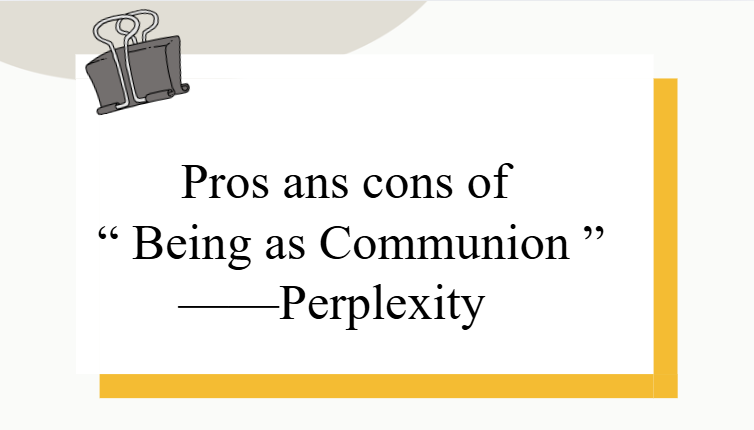The concept of “Being as Communion” proposed by Zizioulas has made a profound impact in both Orthodox and Western circles, celebrated for its relational theology but subject to various critiques.[1][2][3][4][5]
### Pros
– **Orthodox Scholars**
– Restores the primacy of personhood and communion over abstract essence, aligning with patristic (especially Cappadocian) traditions.[3][6]
– Offers a strong theological foundation for ecclesiology, grounding the church community in the relational life of the Trinity, especially in Eucharistic and liturgical practice.[2][7]
– Invokes an appealing alternative to secular individualism, emphasizing that true human identity and freedom come through loving relationships rather than solitary autonomy.[6][3]
– Celebrates “otherness” within unity, suggesting that diversity is not erased but perfected in the Church’s communal life.[8][6]
– **Western Scholars**
– Stimulates ecumenical dialogue and provides fresh resources for Trinitarian theology, personhood, and ecclesiology.[4][1]
– Engages critically with Western philosophical tendencies toward substance metaphysics, offering a critique of individualism and underpinning a “social” model of the Trinity.[1][8]
– Influences modern discussions on the role of community and personhood in church, society, and even non-theological philosophy.[2][4]
### Cons
– **Orthodox Critiques**
– Some argue Zizioulas oversimplifies or artificially unifies the theological positions of the Cappadocian Fathers, risking historical inaccuracy in their nuanced views.[9][4]
– Concerns exist that his strong focus on the bishop’s authority within Eucharistic ecclesiology may underplay wider communal participation or overemphasize hierarchy.[6]
– Some Orthodox theologians resist Zizioulas’s existentialist strand, fearing it could relativize the objective, dogmatic tradition of the Church.[3][6]
– **Western Critiques**
– Western theologians sometimes find Zizioulas’s reading of early church sources, especially the Cappadocians, to be overly selective or interpretive—using them more as dialogue partners than historical authorities.[4][9]
– Feminist and liberationist theologians warn that Zizioulas’s reliance on Trinitarian “monarchia” (primacy of the Father) risks endorsing hierarchical and patriarchal models, potentially justifying exclusion or oppression.[10]
– The broad philosophical claims are occasionally considered vague or insufficiently grounded for systematic theology in the Western academic context.[5][1][4]
### Table Overview
| Perspective | Pros | Cons |
|———————|——-
| Orthodox Scholars | Revives patristic tradition of personhood and communion [3][6] | Risks historically flattening Cappadocians, hierarchy concerns [9][6] |
| | Enhances ecclesiology and the communal/relational self [2][3] | Existential focus possibly clashes with dogmatic tradition [6][3] |
| Western Scholars | Stimulates ecumenical discussion, Trinitarian dialogue [4][1] | Historical selectivity, critique of “monarchia” and possible patriarchal implications [4][10] |
| | Critiques individualism, supports “social Trinity” model [2][1] | Philosophical claims sometimes seen as vague or less systematic [1][5] |
In sum, Zizioulas’s vision of “being as communion” is both celebrated for its creative theological synthesis and critiqued for potential historical oversimplifications, philosophical ambiguity, and ecclesial hierarchy concerns—points debated by both Orthodox and Western scholars.[5][10][1][3][4][6]
Sources
[1] Beyond “Being as Communion” – Ad Fontes Journal https://adfontesjournal.com/
[2] Being as Communion | John D. Zizioulas – Stephen Barkley https://stephenbarkley.com/
[3] The Individual and the Church – John Zizioulas Foundation https://zizioulas.org/
[4] [PDF] what Western theologians can learn from John Zizioulas’ reading of … https://orca.cardiff.ac.uk/id/
[5] [PDF] A critical study on Zizioulas’ ontology of personhood – HKBU Scholars https://scholars.hkbu.edu.hk/
[6] [PDF] Communion and otherness in John Zizioulas’ theology of … https://www.domuni.eu/media/
[7] Zizioulas and the Church that is Communion https://glory2godforallthings.
[8] “Difference without Division. Communion and Otherness … https://pemptousia.com/2017/
[9] Beyond “Being as Communion” – John Zizioulas Foundation https://zizioulas.org/
[10] A Feminist Critique of Monarchia in John Zizioulas’ Doctrine of the … https://love2justice.
[11] Anyone read ‘Being as Communion’ by Met. Zizioulas? – Reddit https://www.reddit.com/r/
[12] The Eucharistic Communion and the World https://zizioulas.org/
[13] Part 1 — Review of Being As Communion | 40 Bicycles https://40bikes.wordpress.com/
[14] Take and Read: Being as Communion | National Catholic Reporter https://www.ncronline.org/
[15] Being as Communion (John Zizioulas) – The Puritan Board https://puritanboard.com/
[16] Communion and Otherness – John Zizioulas Foundation https://zizioulas.org/
[17] Being as Communion – SVS Press & Bookstore https://svspress.com/being-as-
[18] Being and Communion – CWoznicki Think Out Loud https://cwoznicki.com/2019/10/
[19] Being as Communion | A vow of conversation – WordPress.com https://avowofconversation.
[20] Hell (Unfortunately) Yes: Why I Can’t Be a Universalist https://blogs.ancientfaith.




